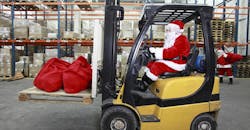Trade War Is Already Threatening to Ruin Christmas for Retailers
It may only be July, but Christmas is fast-approaching for U.S. retailers -- and the threat of an escalating trade war with China has industries that have so far been spared increasingly worried their goods will be next on the naughty list.
President Donald Trump’s threat to slap tariffs on at least another $200 billion in goods from China -- on top of the $34 billion that went into effect on July 6 -- are ramping up fears that the all-important holiday-shopping season will be a casualty in the battle with America’s largest trading partner.
“Retailers have already made the buying decisions for what will be on the store shelves in the fall for Christmas holidays,” said David French, senior vice president of government relations at the National Retail Federation. If items aren’t imported before any possible tariffs go into effect, it will lead to “higher prices, a cut into consumer spending and a cut into consumer confidence -- and we are very concerned about it.”
The Trump administration has so far made good on its promise to keep consumer goods off the initial round of tariffs, with the 25% levy on $34 billion of imports that came into effect on July 6 focused on machinery. But if a new trade agreement isn’t reached, Trump has threatened to add a 10% tariff on an additional $200 billion of Chinese-made goods, potentially doubling that to as much as $400 billion in the event of Chinese retaliation. That would capture about 80% of all Chinese imports and ensure some sneakers, clothing, smartphones and even toys would be targeted.
Karaoke Machines
“It creates a lot of uncertainty for everybody,” said Gary Atkinson, CEO of Fort Lauderdale, Fla.-based Singing Machine Co., which sources 100% of its karaoke machines and other gear from China. “Hopefully, our product line never shows up on one of those list of tariffs.”
But if it does, the small publicly traded company would go down the same path that thousands of others have since Trump began enacting tariffs on other countries like Mexico and Canada in a push to reduce America’s trade deficit. Atkinson says he’d likely have to raise prices, which would decrease demand -- a big risk during the critical holiday shopping season. That would cause the company to place fewer orders from its Chinese suppliers, which would in turn hurt them, too.
“It would have a trickling effect all the way down,” Atkinson said.
One major issue is that supply chains can’t be moved overnight, especially for a retail sector that tends to place orders months before items arrive in stores. U.S. companies have spent years forging business relationships overseas and have come to rely on the expertise and reliability of Chinese factories. In the toy industry there are few options outside of China, especially with more complicated items.
“We tried Vietnam and Indonesia, and they don’t have the infrastructure the Chinese do,” said Isaac Larian, CEO of toymaker MGA Entertainment Inc. “The toy business is dependent on the Chinese, and I don’t see that changing.”
Next Round
In addition to the tariffs on $34 billion of Chinese goods that began at 12:01 a.m. in Washington, an additional set of duties on $16 billion of goods against the nation is still pending. China has said it will hit back matching each of those amounts in tit-for-tat tariffs against the U.S., thus making official a trade war that has brewing since Trump called for extra duties in March.
“Everybody’s anxious about the administration’s actions here boomeranging and hurting American consumers as they go shopping for the holiday season,” NRF’s French said.
There are still a few things that need to happen for the trade war with China to escalate to the point of hitting retailers and consumer goods. For instance, Trump’s administration needs to officially announce the new round of $200 billion tariffs -- so far, he’s just threatened it.
Negotiating Tactic
UBS Securities economist Robert Martin said he sees the threat of as much as $400 billion in new levies as just a negotiating tactic. China and the U.S. will likely reach some kind of resolution in order to avoid the mutual economic harm of a rapidly escalating trade war, said Martin, who served on President George W. Bush’s Council of Economic Advisers.
“We believe the tariffs stop at $50 billion from the U.S., and that you don’t see the extra $400 billion,” Martin said. But if he’s wrong, what lies ahead is “uncharted territory,” with the potential for severe economic effects.
And that could be a blow for a retail sector that’s still struggling with broader industry shifts and falling foot traffic.
“Businesses can adjust to almost anything, except uncertainty,” said Hannah Kain, CEO of Alom Technologies Corp., a supply chain management company. “There is so much uncertainty out there that everyone is sitting back and waiting to see what happens.”
By Matt Townsend and Hema Parmar
